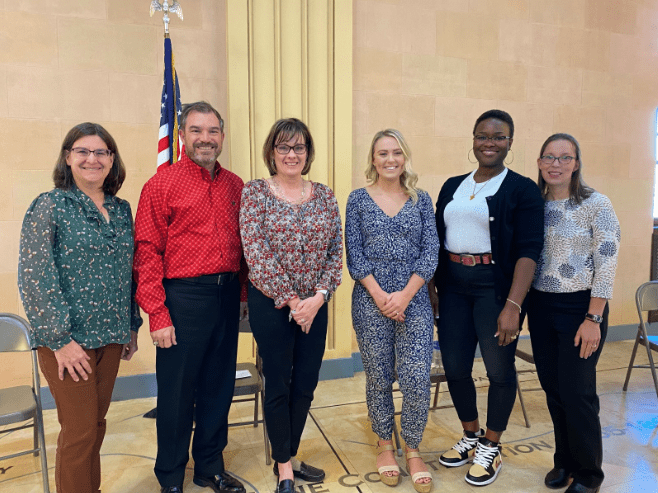
Learning Starts with Listening: Creating Community for Military Families
by Courtney Power, Deputy Director of Workforce Development
Occasionally situations in life allow the blending of your personal and professional identities. As a veteran, military spouse, and parent of military-connected children, I am personally very passionate about bridging the civilian-military divide to generate a culture and community of understanding and belonging. As an education and workforce development professional, I care deeply about ensuring equitable opportunities for all students.

Military spouses, including NextFlex’s Deputy Director of WFD Courtney Power, shared their perspectives with members of the Greater Cheyenne Chamber of Commerce (WY).
Recently, I had the opportunity to sit on a panel of military spouses hosted by the Greater Cheyenne Chamber of Commerce. The goal of the panel was to provide first-hand perspectives on the challenges that military families can face – education, employment, licensure, childcare, a sense of belonging – and provide ideas for actionable steps the civilian community can take to provide support.
There are an estimated 185,000 military-connected students who change schools annually due to military moves. In fact, military children move an average of 6 to 9 times during their K-12 academic careers. Frequent relocations can result in curriculum changes, learning gaps, duplicate coursework, missed sports tryouts, and a lack of continuity, opportunity, and access – overall, always being the “new kid.”
My oldest child is currently in 8th grade and has already been enrolled in four different school districts. He has been a Maxwell Eagle (Alabama), Sandia Base Mustang (New Mexico), Ashland Falcon (Virginia), Benton Cougar (Virginia), and McCormick Warrior (Wyoming). These changing mascots represent unique school cultures and identities. For military-connected students, having a spirit shirt for their new school can be an important and tangible step to a sense of belonging. Schools can provide spirit shirts free to students, either through fundraising or business sponsorship, as a concrete way to say “welcome” and “you belong” to new students. At a policy level, states can enact advanced enrollment provisions to permit military-connected students to enroll in their prospective school prior to physically arriving in the area. Such provisions allow for participation in school lotteries for specialty programs, registration for courses, and early coordination for educational supports like special education or gifted services. Currently, 34 states have advance enrollment policies though all 50 states have adopted the Interstate Compact on Educational Opportunities for Military Children which outlines best practices for transfer of records, graduation requirements, and course placement.
Military families may find themselves assigned to communities that do not look like them. According to the Department of Defense, 41% of the military identifies as a member of a minority group. This level of diversity is similarly present in military families. In April 2022, the DoD released an Equity Action Plan which outlines a holistic strategy to cultivate enduring change. Civilian communities must likewise be reflective and proactive in routing out racism and bias. Doing so will create a welcoming community for all individuals, including those from minority populations. These are hard conversations to have but they are necessary to support and sustain our national defense through an innovative, agile, and diverse military population.
If you are looking to grow your knowledge of the military family lifestyle through evidence-based research, I suggest connecting with Blue Star Families, the National Military Family Association, and the Military Child Education Coalition. If you’re looking to grow your knowledge of the benefits and challenges of this lifestyle, I suggest connecting with a member of the military community and asking them to share their story. There is work to be done, but a community open to listening takes the first step toward learning and taking action.

